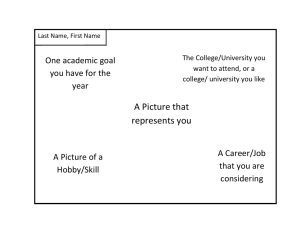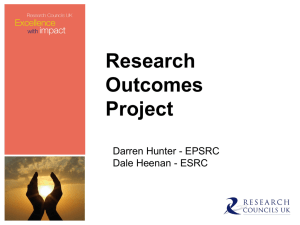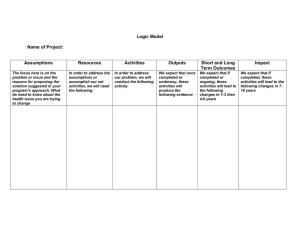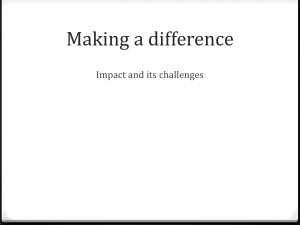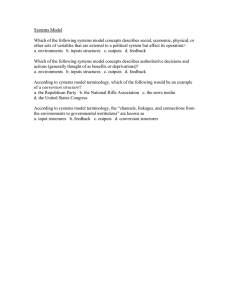my individual assessment of open access
advertisement
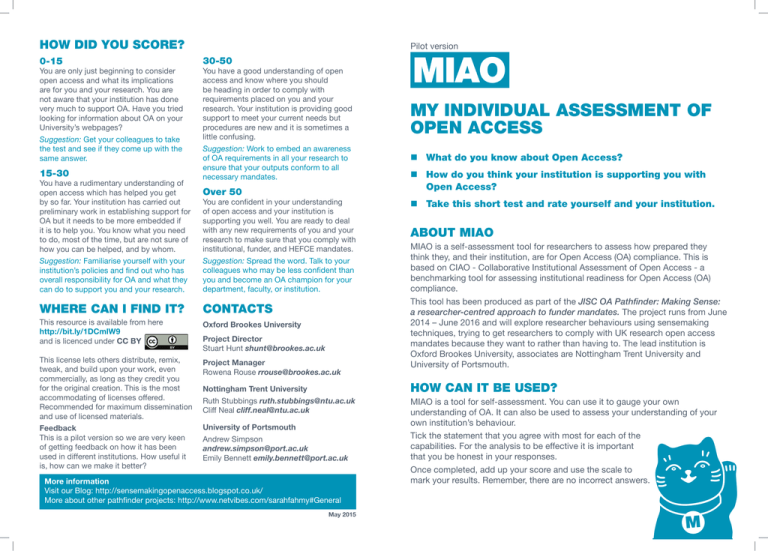
HOW DID YOU SCORE? 0-15 You are only just beginning to consider open access and what its implications are for you and your research. You are not aware that your institution has done very much to support OA. Have you tried looking for information about OA on your University’s webpages? Suggestion: Get your colleagues to take the test and see if they come up with the same answer. 15-30 You have a rudimentary understanding of open access which has helped you get by so far. Your institution has carried out preliminary work in establishing support for OA but it needs to be more embedded if it is to help you. You know what you need to do, most of the time, but are not sure of how you can be helped, and by whom. Pilot version 30-50 You have a good understanding of open access and know where you should be heading in order to comply with requirements placed on you and your research. Your institution is providing good support to meet your current needs but procedures are new and it is sometimes a little confusing. Suggestion: Work to embed an awareness of OA requirements in all your research to ensure that your outputs conform to all necessary mandates. Over 50 You are confident in your understanding of open access and your institution is supporting you well. You are ready to deal with any new requirements of you and your research to make sure that you comply with institutional, funder, and HEFCE mandates. Suggestion: Familiarise yourself with your institution’s policies and find out who has overall responsibility for OA and what they can do to support you and your research. Suggestion: Spread the word. Talk to your colleagues who may be less confident than you and become an OA champion for your department, faculty, or institution. WHERE CAN I FIND IT? CONTACTS This resource is available from here http://bit.ly/1DCmlW9 and is licenced under CC BY Oxford Brookes University This license lets others distribute, remix, tweak, and build upon your work, even commercially, as long as they credit you for the original creation. This is the most accommodating of licenses offered. Recommended for maximum dissemination and use of licensed materials. Project Manager Rowena Rouse rrouse@brookes.ac.uk Feedback This is a pilot version so we are very keen of getting feedback on how it has been used in different institutions. How useful it is, how can we make it better? University of Portsmouth Project Director Stuart Hunt shunt@brookes.ac.uk MY INDIVIDUAL ASSESSMENT OF OPEN ACCESS What do you know about Open Access? How do you think your institution is supporting you with Open Access? Take this short test and rate yourself and your institution. ABOUT MIAO MIAO is a self-assessment tool for researchers to assess how prepared they think they, and their institution, are for Open Access (OA) compliance. This is based on CIAO - Collaborative Institutional Assessment of Open Access - a benchmarking tool for assessing institutional readiness for Open Access (OA) compliance. This tool has been produced as part of the JISC OA Pathfinder: Making Sense: a researcher-centred approach to funder mandates. The project runs from June 2014 – June 2016 and will explore researcher behaviours using sensemaking techniques, trying to get researchers to comply with UK research open access mandates because they want to rather than having to. The lead institution is Oxford Brookes University, associates are Nottingham Trent University and University of Portsmouth. Nottingham Trent University HOW CAN IT BE USED? Ruth Stubbings ruth.stubbings@ntu.ac.uk Cliff Neal cliff.neal@ntu.ac.uk MIAO is a tool for self-assessment. You can use it to gauge your own understanding of OA. It can also be used to assess your understanding of your own institution’s behaviour. Tick the statement that you agree with most for each of the capabilities. For the analysis to be effective it is important that you be honest in your responses. Once completed, add up your score and use the scale to mark your results. Remember, there are no incorrect answers. Andrew Simpson andrew.simpson@port.ac.uk Emily Bennett emily.bennett@port.ac.uk More information Visit our Blog: http://sensemakingopenaccess.blogspot.co.uk/ More about other pathfinder projects: http://www.netvibes.com/sarahfahmy#General May 2015 M MY INDIVIDUAL ASSESSMENT OF OPEN ACCESS (MIAO) based on the CARDIO tool - http://www.dcc.ac.uk/projects/cardio | For each section, tick the statement that matches you and your institution I have not formally considered the need for policy in this area. I am aware that the OA landscape is changing and am reviewing whether we should change my publishing practices. Institutional Policy & Strategy on OA 1 I have not formally considered the financial implications of OA for my research. Financing OA 1 Services for OA support I am not aware that my institution has considered the services required for OA support or the areas in which those services may reside. 1 2 My institution has a policy which does not support publication in hybrid journals. There is a block grant and distribution will be on a case by case basis. 2 My institution is considering what/where support for OA may be best located and is considering what resources are needed to put this in place. 2 My institution have reviewed our publication practices and have drafted an OA position paper / statement / policy. There is on going consultation with researchers and relevant support staff. I am aware of good practice internally and externally. I am aware of discussions about roles and responsibilities of relevant stakeholders in delivering services to support OA. 3 My institution has decided to have a publication fund of £xxx. but I am not aware how it is going to be allocated. 3 My institution has agreement on where/what staff will be available and has thoughts on how this could best be resourced. It is considering what training/development is needed for those staff. 3 My institution has developed an OA policy and strategy, supported by relevant guidance. My institution is discussing roles and responsibilities of relevant stakeholders in delivering services to support OA. I am aware that steps have been taken to communicate our OA policies and support. 4 My institutuion has a publication fund and a policy of how it will be allocated. I have been informed about this. 4 My institution is training/hiring staff to support OA and putting resources in place to continue the sustainability of the resource. 4 My institution has ratified its policy and guidelines and these are well communicated and I have adopted them. I have a high awareness of the OA environment, funding body and OA requirements for REF2020 and the appropriate use of exceptions. 5 My institution has a publication fund and policy of how it will be allocated. I am aware of the technical processes and staff resources in place to manage all of this. 5 I have clear support for OA, both at Institutional, Faculty/Departmental and researcher level. Resources are in place to ensure that this support is adequately funded and processes are available to review the support to ensure that it continues to be fit for purpose. 5 SYSTEMS AND PROCESSES System to gather data for OA compliance I have not yet considered what systems/ processes are required for my institution to monitor OA compliance. 1 Documentation/visibility of process I have not received any documentation on what is required to support OA, or what form it might take and where it might be held. 1 Reporting, monitoring and audit I am not aware that my institution has considered what reports may be required or whether our systems will deliver the relevant data. 1 I am not aware of embargoes nor that my institution has considered ways to deal with them. My institution is investigating what systems/ processes are required for me to ensure that I comply with OA funder requirements, effectively and efficiently. 2 My institution is considering the most appropriate form of documentation and the best way to make it available. 2 My institution has considered the kinds of reports that are needed and are starting to define these. 2 My institution is aware of the issues involved and is considering ways to overcome them. My institution is developing systems/processes but has not yet got these fully tested them. 3 My institution is in the process of documenting OA processes. 3 My institution is designing a suite of reports to meet management needs and to ensure that I comply with funder mandates. 3 My institution is defining procedures and designing tools to meet my need to comply with embargoes. My institution has systems and staff in place to monitor OA compliance. This has been communicated to me. 4 I am aware that there is draft OA documentation. My institution is taking steps to communicate our OA documentation to me. 4 My institution has developed a suite of reports that will allow them to monitor and manage OA compliance. 4 My institution is testing its systems and workflows so that my outputs are available under OA as soon as possible. Publication Embargoes 1 2 3 4 My institution's system has been tested and I am confident that it is robust and delivers all the information needed for compliance with HEFCE/RCUK/Wellcome Trust/other requirements as they are currently outlined. I know and understand how to use the system and checks are in place to intervene if I do not adhere to the correct processes. 5 My institution has fully documented all processes, and procedures are in place to ensure these are kept up-to-date. The documentation is easily available/ accessible to me. 5 My institution has full, easily accessible reports which produce useful data on compliance with policies but also researcher engagement. It can produce data that demonstrates that compliance for audit purposes. 5 I am fully compliant with current HEFCE/RCUK/WellcomeTrust/other requirements. My institution has tested that embargoes are managed in our systems and the correct metadata/full-text versions released to the public at appropriate times/in appropriate ways. Processes are fully documented and can demonstrate my compliance to support any audit requests. 5 5 COMMUNICATION AND STAFF DEVELOPMENT I am not aware that my institution has considered the ways in which advocacy should occur. Advocacy 1 Advice on where to publish in an OA environment I have not received advice about OA publishing nor am not aware that my institution has considered how to give me advice. 1 I have not considered how OA may affect my research impact, nor am I aware that my institution has done so. Impact of OA on research profile 1 Outputs eg. books. non textual and research data not yet OA I am not aware that my institution has considered how to deal with outputs not covered by HEFCE/RCUK/ Wellcome Trust mandates. 1 My institution is aware of the need for advocacy and that different groups of researcher may require different methods of communication and training. 2 My institution is considering the most appropriate way to support me and is discussing with me the most suitable way to provide support and mentoring. 2 My institution is revewing the possible implications of OA on impact in relevant fora and considering how to respond. 2 My institution is starting to consider what to do and ways to progress with outputs not covered by HEFCE/RCUK/Wellcome Trust and ways to move forward. This has been discussed with me. 2 My institution is starting to develop a range of communication and training methods to cater for my current information needs, but which will also be robust in the future. 3 My institution is starting to draw up processes to support and mentor me and identify the different kinds of advice and support that I may need at different points in my career on where to publish in an OA environment. 3 My institution is starting to design processes which will help me gather evidence of the impact of my research. 3 My institution has draft policies in discussion and is starting to think about how its systems may need to be adapted to respond to these extra needs. I am aware that training programmes are starting to be set up for relevant staff so that they can respond appropriately. 3 My institution has developed a range of communication and training methods to different groups and is drafting a formal training and communication plan. 4 My institution has developed support and/or mentoring processes to support me publishing in the OA environment. Support will be revised in light of my feedback. I have been involved in discussions more widely via formal and informal channels within my discipline. 4 My institution is starting to trial ways/means to collect appropriate evidence relating to impact from access to my OA outputs. 4 My institution is working closely with researchers who produce outputs in this category to ensure that our material is made OA as appropriate. 4 I have received training and regular information about changes in the OA environment (eg changes/amendments to REF rules). Support and mentoring systems exist in all subject disciplines and it is clear to me where/how to draw upon this advice. The issue is discussed regularly in departmental meetings and in developmental reviews/appraisals/equivalent annual contact points. 5 My institution has processes to consider/review/OA in terms of how it is affecting the research and significance of my impact. It collects data about downloads etc. and other evidence that links accessibility of my outputs to changes/ benefits. 5 My institution has policies to guide me on how to respond to these issues. Processes are in place which can deal with most forms of my output or data. Staff are available who can advise on the issues involved and documentation is available to support me. 5
